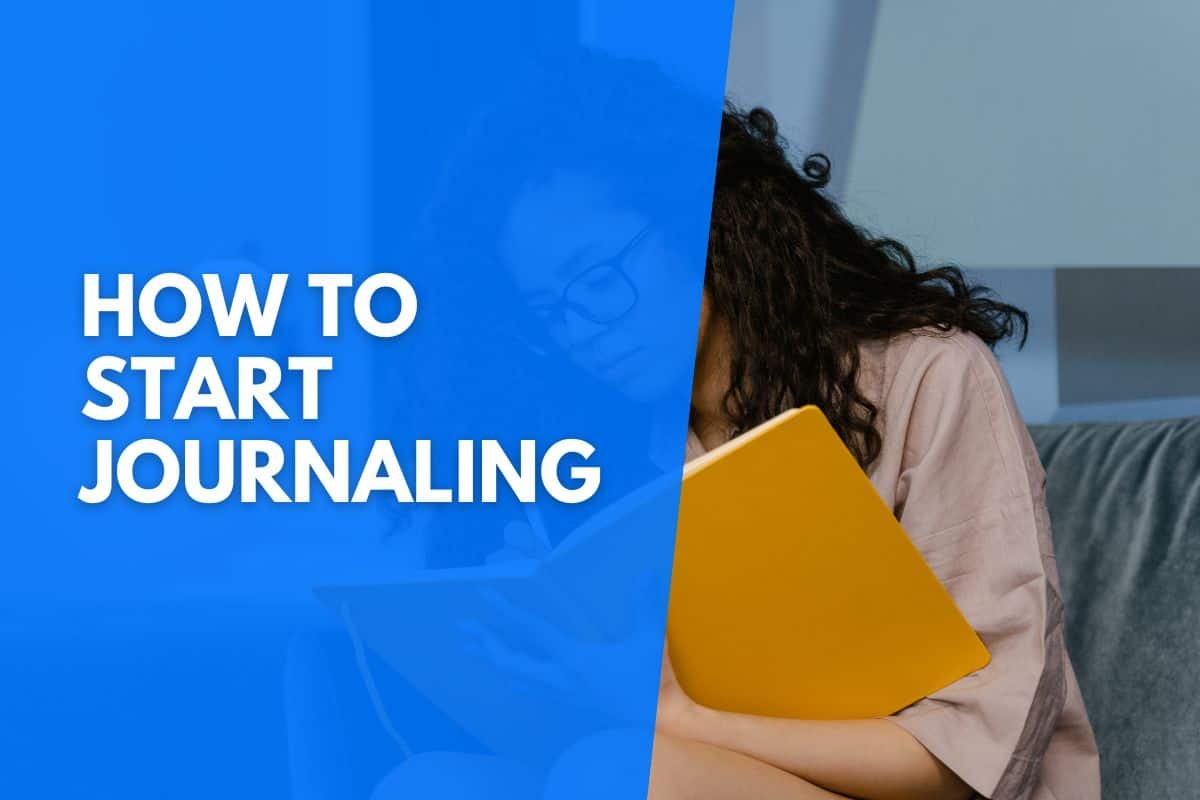The daily art of keeping a journal seems to be somewhat lost in the modern world that we live in, but the truth is that keeping a journal is an excellent way to destress, maintain mental health, and keep yourself focused on the intensity of modern life.
If you want to start journaling but do not know how to begin, there are some simple and effective methods to help you get going and explore this creative habit at your own pace.
There are several ways to start journaling, and the process is different for everyone, but there are some things to consider that can reduce the barrier to entry and make journaling feel less daunting in the beginning.
Let’s learn how to start journaling in a way that suits you best.
How to start journaling:

1. Choose A Notebook And Pen
The first part of the process of starting journaling is to get yourself a good notebook and pen. It may feel trivial to spend some money on a high-quality journal and a good journaling pen, but the reality is that if you put some real money into your journal and pen at the beginning, you are far more likely to keep using them, as leaving them unused will feel wasteful.
Try to find a journal that inspires you. Visit your local stationary store or look online for a journal that has good, thick pages made from high-quality paper.
Try to find a journal that you find useful. For example, some people find blank pages more useful as they want to do more than write in their journals, while others prefer using graph pages for the structure that these lines provide. Explore the different options and choose the type of journal that feels best to you.
Another good tip is to look for a journal that suits your style. If you like having funky and colorful items in your life, choose a fun and colorful journal that will make you happy to look at. If your style is more minimalist, then look for something simple that will feel inviting.
At the end of it, look for a journal that feels good to you and makes you want to write in it.
A good pen is also important when beginning journaling. You probably have a good idea about which pens you are like to use, so try to find a high-quality version of the pens that you enjoy. Find pens that make you want to write and buy a few of them.
Using pens of different colors can be a good journaling technique, so consider buying some good pens of different colors. A set of blue, black, and red ink pens is ideal for most journals, and most people have no need for a full rainbow-colored set of pens for journaling.
2. Find A Quiet Place
The best way to begin journaling, especially when you are trying to build this practice into your life, is to put yourself in a place where there are few distractions, and you can start your journaling journey well.
Trying to write in a busy or noisy place like a coffee shop or in the office is not ideal, especially when just starting out. Find a quiet place where you can put yourself into the journaling mindset, and give yourself a big block of time to start exploring the process.
As you build your journaling skills, writing in busier places will be easy, but the early stages of learning to do this require focus and peace so that you can find the methods and processes that work well for you.
Every journal is different, and everyone who keeps a journal approaches it differently. Finding your journaling style can be difficult, with a lot of outside noise keeping you from what you are trying to do.
Find a quiet, inspiring place to write, and put pen to paper. It does not matter what you write in the beginning but just start. As you write, more ideas and thoughts will flow from you, and the quiet environment will enable you to capture them on the page well.
Remember that a quiet place does not always have to be a place that is externally quiet. A quiet place is also a place where you can quiet yourself. The beach is not quiet as the waves crash loudly, but it is a place where you can be quiet in yourself, which is ideal for journaling.
3. Write Whatever Comes To Mind
When starting to write in a journal, it can feel awkward and difficult to start writing if you are not yet fully invested in the process.
The best thing to do when starting a journal is to write about anything that comes to mind. Put your pen on the page and fill the page with whatever you are thinking.
This could include your aspirations for the journaling process, the steps that you took to find your journal and your favorite pens, it could be what has happened in your day, or even a simple sketch to get things going.
Take your time to write, and try not to be too serious. Journaling can be anything you need it to be on any day, but the first day should be fun and exciting to encourage yourself to keep doing it.
Write whatever comes to mind on your first day of journaling, put the date on the page, and continue writing the next day.
You will soon find the things that you like to write about, and you will quickly find the aspects of journaling that you enjoy. Lean into this process and stick with what you feel is fun at the moment. Remember that journals do not have to be about anything specific, and they can change from day to day.

4. Try Not To Be Selective
An important consideration to make when starting the journal is to not be selective about what you put in your journal. Building your journaling skills is about building the habit of writing and using your journal daily.
If you wait for inspiration or if you only write specific things in your journal, or even if you only use your journal for one or two specific things, you may find yourself not using your journal at all after a few days, as writing these things down may feel like more effort than they are worth.
However, if you use your journal for everything, you will quickly build the habit, and journaling will become a normal part of your daily life.
Try not to be selective about what you put in your journal, especially in the beginning. Use your journal for all the lists that you need to make, for writing down reminders, for keeping your schedule, and even for doodling.
Using your journal often in this way establishes it in your life as a method for processing and daily function, which over time, will enable you to collect your thoughts well, process well internally, and use your journal for the things that you want to write about.
5. Keep Your Journal With You
When learning to journal or incorporate journaling into your life, it is crucial to keep your journal with you. It does not work for everyone to have a set journaling time of day, so keeping your journal with you as you move through your day enables you to use your journal at every opportunity.
Learning to use your journal like this teaches you how to journal. It teaches you what should be written down and what should not, what is worth saying and what is not, and it even develops your journaling skills, such as penmanship and compartmentalizing.
Keep your journal with you in your day, and use it whenever you remember it. Keep it on your desk ready to be used when the need arises, use it for writing down all important information, keep your schedule in it, and refer to it often when you need to remember something.
If your journal is always with you, you will never have an excuse not to use it. This will quickly lead to active and useful journaling in your daily life.
6. Write Every Day
The best way to begin journaling is to write every day. This should be a goal of everything who wants to incorporate journaling into their lives or those who want to use journaling as a tool for productivity or expression.
If you want to journal well and maintain the habit of journaling every day, be sure to put something in your journal every day. Even if you reach the end of the night and have yet made a journal entry, take a few minutes to put something in your journal.
It could be anything, but write in you’re your journal every day. Knowing that you have to write something in your journal every day helps you to look for things to write about and helps to keep you more attentive throughout the day.
If you have to write something, you have to have something to write about. Keeping yourself accountable to writing every day teaches you how to journal more than any other method, as it becomes part of your daily life; it teaches you to look for things to write about, it helps you to remember daily events, and it builds the habit quickly.
There is no better way to start journaling than to simply write every day.
7. Experiment In Your Journal
The process of learning to the journal is different for everyone. No two journals look alike, and no two journals are used in the same way.
It is very important when learning to journal well to experiment with your style of journaling. Many people enjoy having set starting pages every day with the same prompts written on them, others like to use different colored pens for different entries, and others enjoy doodling or creating colorful borders on every page.
Find your journaling style, and allow it to change and grow over time. Experiment with different handwriting, use different pen thicknesses, try different colors and inks, and play with different page formats as well.
Journals are meant to be creative as much as they are good tools for personal growth. Allow your journal to change and grow as you do, thus making your journal uniquely yours.
8. Set Aside Time To Journal
It is important for everyone who is learning to journal to be sure to set aside enough time to journal well.
It is not always possible to set aside two or three hours for journaling, but it is important to keep some time in your day for writing if this is something that you want to maintain for the long term.
Journaling does not need to be a time-consuming activity, but the better you get, the faster you will be able to write and create journal entries.
Start the journey by setting aside an hour every day or chunks of time that add up to an hour every day. This will enable you to find your writing style and voice while learning to journal, and as you progress with the skill, add or subtract the time that you utilize for journaling each day.
The amount of time that you need for journaling depends on the type of journaling you like to do, your own personal writing and journaling style, and how dedicated you are to journaling.
Journaling can be a short period of reflection every evening, or it can be a large portion of time set aside every morning for planning, writing, drawing, and creativity.
Most people find that journaling is best when they have larger chunks of time to write, but many people prefer journaling on the go as they move through their day. Both methods are effective, as there is no wrong or right way to journal.

9. Explore Journaling Options
Another good way to start journaling is to explore journaling options. Many people have tried journaling by writing in a notebook and found it to not be the right method for them. The good news is that while the modern world can be intense, it is full of many fantastic journaling methods.
When it comes to journaling, many people prefer to use their laptop, smartphone, or even tablet, like journaling on an iPad. While using a smartphone may be slower, it can still be effective since most people carry their phones with them everywhere, making journaling more accessible.
Additionally, using a smartphone with a dedicated journaling app can allow for making sketches and drawing diagrams, which can add an artistic element to your journal entries.
Using a laptop for journaling is somewhat limiting as it is far more challenging to create diagrams and sketches, but for people who type very quickly, using a laptop can be ideal. Most people have very easy access to a laptop at any time of the day or night, and using a laptop can be a great way to get into journaling if you prefer typing to write.
Another excellent option is to use a journaling notebook. There are several journaling notebooks out there that are full of daily structured pages with prompts for daily journaling.
These prompts include a happiness rating, a daily log, and section for thought, places for note-taking and list-making, and several other integrated features that make journaling far easier and feel much more structured.
Exploring the journaling options available to you will help you to find a method that inspires and entices you. Finding the best journaling method for you is important, as it will help you keep up with your journaling goals.
10. Don’t Give Up!
The last item here on how to start journaling is to not give up. Journaling is a rewarding process, but it can be time-consuming, and it can be challenging to start.
Learning to write something down every day is particularly difficult in the fast-paced world that we live in, and taking the time to sit down and make journal entries can feel impressible on some days.
However, if you keep with it and keep writing every day, you will quickly find that journaling will become a seamless and integral part of your day, every day.
Journaling will become as important to you as rest, and it will become something you prioritize, especially if you enjoy it.
Learning to journal is a beautiful process that requires time and effort, but the truth is that few activities are more rewarding, fulfilling, and peaceful.
Everyone can benefit from journaling, and everyone will grow while learning to journal.
When you start the process, don’t stop. Keep writing, keep drawing, keep making lists, keep creating, keep exploring, and keep journaling.
The cost is well worth the outcome.




